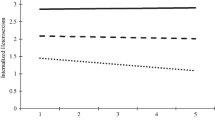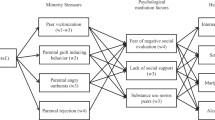Abstract
Sexual minority youth are more likely to experience homelessness, and homeless sexual minority youth report greater risk for mental health and substance abuse symptoms than homeless heterosexual youth, yet few studies have assessed determinants that help explain the disparities. Minority stress theory proposes that physical and mental health disparities among sexual minority populations may be explained by the stress produced by living in heterosexist social environments characterized by stigma and discrimination directed toward sexual minority persons. We used data from a sample of 200 young men who have sex with men (YMSM) (38 % African American, 26.5 % Latino/Hispanic, 23.5 % White, 12 % multiracial/other) to develop an exploratory path model measuring the effects of experience and internalization of sexual orientation stigma on depression and substance use via being kicked out of home due to sexual orientation and current homelessness. Direct significant paths were found from experience of sexual orientation-related stigma to internalization of sexual orientation-related stigma, having been kicked out of one’s home, experiencing homelessness during the past year, and major depressive symptoms during the past week. Having been kicked out of one’s home had a direct significant effect on experiencing homelessness during the past 12 months and on daily marijuana use. Internalization of sexual orientation-related stigma and experiencing homelessness during the past 12 months partially mediated the direct effect of experience of sexual orientation-related stigma on major depressive symptoms. Our empirical testing of the effects of minority stress on health of YMSM advances minority stress theory as a framework for investigating health disparities among this population.

Similar content being viewed by others
References
Johnston LD, O’Malley PM, Bachman JG, Schulenberg JE. Monitoring the Future National Survey Results on Drug Use, 1975–2009. Volume I: Secondary School Students. (NIH Publication No. 10-7584). Bethesda, MD: National Institute on Drug Abuse; 2010.
Park MJ, Mulye TP, Adams SH, Brindis CD, Irwin CE. The health status of young adults in the United States. J Adolesc Health. 2006; 39: 305–317.
Arnett JJ. The developmental context of substance use in emerging adulthood. J Drug Issues. 2005; 35(2): 235–253.
Whitbeck LB. Mental Health and Emerging Adulthood among Homeless Young People. New York, NY: Psychology; 2009.
Arnett JJ. Emerging adulthood: a theory of development from the late teens through the twenties. Am Psychol. 2000; 55: 469–480.
Arnett JJ. Emerging Adulthood. New York, NY: Oxford U. Press; 2004.
Thompson SJ, Maguin E, Pollio DE. National and regional differences among runaway youth using federally-funded crisis services. J Soc Serv Res. 2003; 30(1): 1–17.
Tyler KA, Hagewan KJ, Melander LA. Risk factors for running away among a general population sample of males and females. Youth Soc. 2011; 43: 583–608.
Greene JM, Ennett ST, Ringwalt CL. Substance use among runaway and homeless youth in three national samples. Am J Public Health. 1997; 87(2): 229–235.
Clatts MC, Goldsamt L, Yi H, Gwadz MV. Homelessness and drug abuse among young men who have sex with men in New York City: a preliminary epidemiological trajectory. J Adolesc. 2005; 28(2): 201–214.
Molnar BE, Shade SB, Kral AH, Booth RE, Watters JK. Suicidal behavior and sexual/physical abuse among street youth. Child Abuse Negl. 1998; 22: 213–222.
Rotheram-Borus MJ, Mahler KA, Koopman C, Langabeer K. Sexual abuse history and associated multiple risk behavior in adolescent runaways. Am J Orthopsychiatry. 1996; 66(3): 390–400.
Whitbeck LB, Hoyt DR. Nowhere to grow: homeless and runaway adolescents and their families. New York, NY: Aldine de Gruyter; 2009.
Cochran BN, Stewart AJ, Ginzler JA, Cauce AM. Challenges faced by homeless sexual minorities. Comparison of LGBT homeless adolescents with their heterosexual counterparts. Am J Public Health. 2002; 92(5): 773–777.
Corliss HL, Goodenow CG, Nichols L, Austin SB. High burden of homelessness among sexual minority adolescents: findings from a representative Massachusetts High School sample. Am J Public Health. 2011; 101(9): 1683–1689.
Gattis MN. An ecological systems comparison between homeless sexual minority youths and homeless heterosexual youths. Soc Sci Res. 2013; 39(1): 38–49.
Whitbeck LB, Chen X, Hoyt DR, Tyler KA, Johnson KD. Mental disorder, subsistence strategies, and victimization among gay, lesbian, and bisexual homeless and runaway adolescents. J Sex Res. 2004; 41(4): 329–342.
Noell JW, Ochs LM. Relationship of sexual orientation to substance use, suicidal ideation, suicide attempts, and other factors in a population of homeless adolescents. J Adolesc Health. 2001; 29: 31–36.
Leeuwen JM, Boyle S, Salomonsen-Sautel S, et al. Lesbian, gay, and bisexual homeless youth: an eight-city public health perspective. Child Welfare. 2006; 85(2): 151–170.
Mays VM, Cochran SD. Mental health correlates of perceived discrimination among lesbian, gay, and bisexual adults in the United States. Am J Public Health. 2001; 91(11): 1869–1876.
Meyer IH. Prejudice, social stress, and mental health in lesbian, gay, and bisexual populations. Pscyhol Bull. 2003; 129(5): 674–697.
Meyer IH, Dean L. Internalized homophobia, intimacy, and sexual behavior among gay and bisexual men. In: Herek GM, ed. Stigma and Sexual Orientation. Thousand Oaks, CA: Sage; 1995: 160–186.
Diaz RM, Ayala G, Bein E, Henne J, Marin BV. The impact of homophobia, poverty, and racism on the mental health of gay and bisexual Latino men: findings from 3 U.S. cities. Am J Public Health. 2001; 91(6): 927–932.
Bruce D, Ramirez-Valles J, Campbell R. Stigmatization, substance use, and sexual risk behavior among Latino gay and bisexual men and transgender persons. J Drug Issues. 2008; 38(1): 235–260.
Almeida J, Johnson RM, Corliss HL, Molnar BE, Azrael D. Emotional distress among LGBT youth: the influence of perceived discrimination based on sexual orientation. J Youth Adolesc. 2009; 38: 1001–1014.
Huebner DM, Rebchook GM, Kegeles SM. Experiences of harassment, discrimination, and physical violence among young gay and bisexual men. Am J Public Health. 2004; 94(7): 1200–1203.
Traube DE, Schrager SM, Holloway IW, Weiss G, Kipke MD. Environmental risk, social cognition, and drug use among young men who have sex with men: longitudinal effects of minority status on health processes and outcomes. Drug Alcohol Depend. 2013; 127(1–3): 1–7.
Wong CF, Weiss G, Ayala G, Kipke M. Harassment, discrimination, violence and illicit drug use among young men who have sex with men. AIDS Educ Prev. 2010; 22(4): 286–298.
Stall R, Friedman M, Catania JA. Interacting epidemics and gay men’s health: a theory of syndemic production among urban gay men. In: Wolitski RJ, Stall R, Valdiserri RO, eds. Unequal Opportunity: Health Disparities Affecting Gay and Bisexual Men in the United States. New York: Oxford U. Press; 2008: 251–274.
Coker TR, Austin SB, Schuster MA. The health and health care of lesbian, gay, and bisexual adolescents. Annu Rev Public Health. 2010; 31: 457–477.
Rew L, Whittaker TA, Taylor-Seehaver MA, Smith LR. Sexual health risks and protective resources in gay, lesbian, bisexual and heterosexual homeless youths. J Spec Pediatr Nurs. 2005; 10(1): 11–19.
Ryan C, Huebner D, Diaz RM, Sanchez J. Family rejection as a predictor of negative health outcomes in white and Latino lesbian, gay, and bisexual young adults. Pediatrics. 2009; 123(1): 346–352.
Milburn NG, Ayala G, Rice E, Batterham P, Rotheram-Borus MJ. Discrimination and exiting homelessness among homeless adolescents. Cult Divers Ethn Minor Psychol. 2006; 12(4): 658–672.
Savin-Williams RC. Verbal and physical abuse as stressors in the lives of lesbian, gay male, and bisexual youths: associations with school problems, running away, substance abuse, prostitution, and suicide. J Consult Clin Psychol. 1994; 62(2): 261–269.
Rosario M, Schrimshaw EW, Hunter J. Homelessness among Lesbian, gay, and bisexual youth: implications for subsequent internalizing and externalizing symptoms. J Youth Adolesc. 2012; 51: 544–560.
Rosario M, Schrimshaw EW, Hunter J. Risk factors for homelessness among lesbian, gay, and bisexual youths: a developmental milestone approach. Child Youth Serv Rev. 2012; 34: 186–193.
Wagner G. Internalized homophobia scale. In: Davis CM, Yarber WL, Bauserman R, Schreer GE, Davis S, eds. Handbook of Sexuality-Related Measures. Thousand Oaks, CA: Sage; 1998: 371–372.
Perreira KM, Deeb-Sossa N, Harris KM, Bollen K. What are we measuring? An evaluation of the CES-D across race/ethnicity and immigrant generation. Soc Forces. 2005; 83(4): 1567–1601.
Prescott CA, McArdle JJ, Hishinuma ES, et al. Prediction of major depression and dysthymia from CES-D scores among ethnic minority adolescents. J Am Acad Child Adolesc Psychiatry. 1998; 37(5): 495–503.
Radloff LS. The use of the center for epidemiologic studies depression scale in adolescents and young adults. J Youth Adolesc. 1991; 20(2): 149–166.
Nyamathi A, Branson C, Idemundia F, et al. Correlates of depressed mood among young stimulant-using homeless gay and bisexual men. Issues Ment Health Nurs. 2012; 33: 641–649.
Zerger S, Strehlow AJ, Gundlapalli AV. Homeless young adults and behavioral health: an overview. Am Behav Sci. 2008; 51: 824–841.
Kipke MD, Weiss G, Wong CF. Residential status as a risk factor for drug use and HIV risk among young men who have sex with men. AIDS Behav. 2007; 11: S59–S69.
Schulenberg JE, Zarrett NR. Mental health during emerging adulthood: continuity and discontinuity in courses, causes, and functions. In: Arnett JJ, Tanner JL, eds. Emerging Adults in America: Coming of Age in the 21st Century. Washington, DC: American Psychological Association; 2006: 135–172.
Rew L, Taylor-Seehaver MA, Thomas NY, Yockey RD. Correlates of resilience in homeless adolescents. J Nurs Sch. 2001; 33(1): 33–40.
Gattis MN. Psychosocial problems associated with homelessness in sexual minority youth. J Hum Behav Soc Environ. 2009; 19: 1066–1094.
Ryan C, Russell ST, Huebner D, Diaz RM, Sanchez J. Family acceptance in adolescence and the health of LGBT young adults. J Child Adolesc Psychiatr Nurs. 2010; 23(4): 205–213.
Russell ST, Kosciw J, Horn S, Saewyc E. Safe schools policy for LGBTQ students. Soc Policy Rep. 2010; 24(4): 1–24.
Harper GW, Bruce D, Serrano P, Jamil OB. The role of the internet in the sexual identity development of gay and bisexual male adolescents. In: Hammack PL, Cohler BJ, eds. The Story of Sexual Identity: Life Course and Sexual Identity Narrative Perspectives on Gay and Lesbian Identity. New York, NY: Oxford U; 2009: 297–326.
Pingel ES, Bauermeister JA, Johns MM, Eisenber A, Leslie-Santana M. A safe way to explore: reframing risk on the internet amidst young gay men’s search for identity. J Adolesc Res. 2013; 28(4): 453–478.
Acknowledgments
Support for this study was provided by funding from the National Institute of Mental Health under grant K01 MH 089838. Our deep gratitude goes to our research participants whose thoughtful input made this study possible.
Author information
Authors and Affiliations
Corresponding author
Rights and permissions
About this article
Cite this article
Bruce, D., Stall, R., Fata, A. et al. Modeling Minority Stress Effects on Homelessness and Health Disparities among Young Men Who Have Sex with Men. J Urban Health 91, 568–580 (2014). https://doi.org/10.1007/s11524-014-9876-5
Published:
Issue Date:
DOI: https://doi.org/10.1007/s11524-014-9876-5




